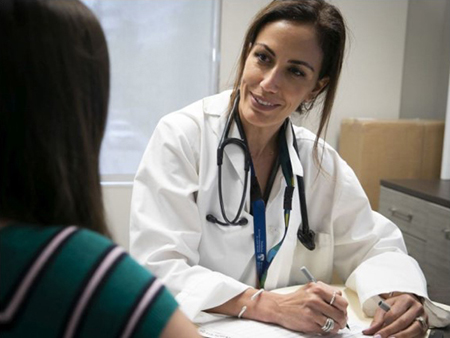- Home /
- Research /
- Programs /
- Cardiovascular Health Across the Lifespan /
- she MATTERS

“she MATTERS”: Improving Cardiovascular Health in New Mothers
The “she MATTERS” (iMproving cArdiovascular healTh in new moThERS) project aims to understand if a breastfeeding intervention can improve blood pressure and markers of metabolic risk in women with recent hypertensive disorders of pregnancy (HDP). Pregnancy complications are risk factors for premature cardiovascular disease (CVD) and stroke that are specific to women. Breastfeeding may be protective against development of hypertension and metabolic syndrome. Information gained from this program will inform personalized sex- and gender-specific approaches to CVD risk management.
This page provides information regarding feasibility project “BP-MOM” which led to the “she MATTERS” program. If you were a participant in our “BP-MOM” study, you will be happy to know that this will serve as your primary link to any updates.
Please explore this page and if you have any questions do not hesitate to contact us!

BP-MOM Pilot Study
BP-MOM (Breastfeeding & blood Pressure patterns in MOthers with recent hypertensive coMplications of pregnancy)
Breastfeeding may lower blood pressure and improve markers of cardiovascular health in the mother. Interventions designed to increase women’s confidence about breastfeeding have been effective in healthy postpartum women, but it is not known whether these types of interventions are helpful for women who have had preeclampsia or high blood pressure in pregnancy. This is an important question to answer, since such women may derive substantial benefits from breastfeeding.
Following childbirth, breastfeeding mothers who have had preeclampsia or high blood pressure during pregnancy were introduced to the BP-MOM study. All eligible, consenting women were randomly allocated to the intervention group (Breastfeeding Self-Efficacy Intervention (BSEI)) or control group (standard postpartum care). Participants allocated to the intervention group received standard postpartum care plus individualized breastfeeding self-efficacy enhancing sessions with a trained registered nurse. Participants in the control group received standard in-hospital and community postpartum care.
Over the course of the study, participants in both groups were asked to fill out questionnaires while in hospital using a computer tablet, and at home via internet. They also had follow-up visits at 3 months, 6 months and 12 months postpartum where they were weighed and measured and had their blood pressure checked.
The main purpose of this pilot study was to assess the feasibility of the BSEI in mothers with HDP. It included a small number of women in order to see whether a larger study (she MATTERS) will be feasible and if so, how it should be designed.
This study reached the targeted goals for recruitment and retention rate and showed very high satisfaction with the intervention. Following the success of our pilot study, we are now ready to launch the multi-center behavioral trial.
“she MATTERS” Project
What is the “she MATTERS” project?
Women who experience complications during pregnancy such as high blood pressure in pregnancy or preeclampsia or delivering a pre-term infant are at risk for high blood pressure and heart disease later in life. These women may also have trouble with breastfeeding their infant. Breastfeeding has been shown to improve infant health. Breastfeeding can also improve the mother’s health by lowering blood pressure, facilitating weight loss and improving cholesterol and blood sugar. Breastfeeding interventions can help women continue breastfeeding but are yet to be tested in women with high blood pressure in pregnancy, since these women may be more likely to stop breastfeeding early.
Currently, there are no accepted medications or interventions to prevent elevated blood pressure and heart disease markers of risk after a complicated pregnancy. Breastfeeding seems to lower blood pressure in the general population but has not been studied in a rigorous trial. So, this study has two unique aspects: (1) it may help some women breastfeed and (2) it may help lower blood pressure without medication.
What is the goal of the “she MATTERS” project?
The goal is to test a nurse-led breastfeeding intervention in women who had high blood pressure problems in pregnancy. We will test whether this intervention improves the breastfeeding practices in these women and will also test whether this reduces blood pressure. In the long-term, we will explore whether this helps to lower the chance of being hospitalized with heart disease or stroke post-partum. High blood pressure problems in pregnancy are related to heart disease and stroke in later life. We are hoping to prevent some heart disease or stroke events in women by improving blood pressure and general health after a complicated pregnancy.
Who can participate in the “she MATTERS” project?
Women who had high blood pressure in pregnancy will be invited to participate from two sites in Quebec and one in Ontario. Women who do not plan on breastfeeding will constitute the first group (control group). This group will receive usual clinical care. Women who will be breastfeeding will be randomly divided into two groups. One group will receive the nurse-led breastfeeding intervention in addition to receiving usual clinical care, whereas the other will receive usual clinical care only. Study outcomes will be assessed by completion of questionnaires and by measuring blood pressure and blood tests. The study will be carried out and overseen by a team with expertise in maternal health.
What are the next steps for the “she MATTERS” project?
Our team is now in the process of recruiting participants and collecting data for “she MATTERS” at the McGill University Health Center and at St. Mary's Hospital in Montreal and at Kingston General Hospital in Ontario. We are also gathering data for a "she MATTERS" sub-study on infants. We are continuing to analyze the data collected in the "BP-MOM" study.
Team members of the “she MATTERS” Project
MUHC | McGill University Health Centre
Montreal, Quebec
SMH | St. Mary’s Hospital
Montreal, Quebec
KGH | Kingston General Hospital
Kingston, Ontario
Other team members
Media coverage of the “she MATTERS” Project
Dr. Dayan’s work has been covered in media interviews and stories by the Heart and Stroke Foundation, the Montreal Gazette, La Presse Canadienne and CTV News Montreal. You can scroll down and click on the links below to learn more.
- First Research Chair in Women’s Heart Health for Quebec
- Heart & Stroke Foundation: Can breastfeeding reduce mother’s heart risk?
- McGill University Health Centre: A Quebec first: Research chair in women’s heart health.
- Montreal Gazette: Breastfeeding is good for babies but how about the immediate effect on mom.
- La Presse Canadienne: Une première chaire sur la santé cardiaque des femmes au Québec
- CTV News Montreal: Heart disease and stroke among top killers for women.
- Radio-Canada: La santé cardiaque des femmes au Québec.
- Infertility Treatment Linked with Slightly Higher Risk of Pregnancy Complications
- CTV Montreal News: IVF linked to slightly higher risk of maternal complications.
- Daily Mail: Women who give birth through IVF are 40% more likely to experience severe bleeding, sepsis or need to spend time in intensive care.
- Medical Research: Absolute Risk Low, but Increased Maternal Morbidity Linked to IVF.
- Québec Science: Traitement de fertilité: plus de complications pendant la grossesse
- National Post: IVF linked to slightly higher risk of maternal complications: study.



